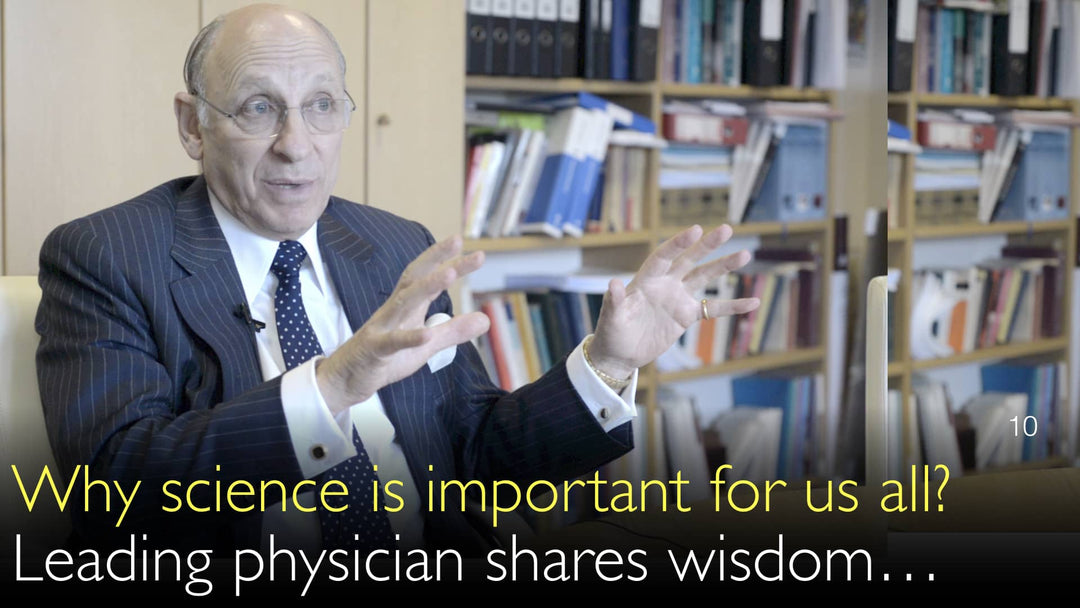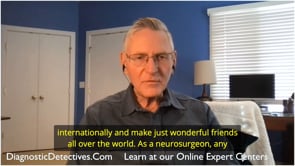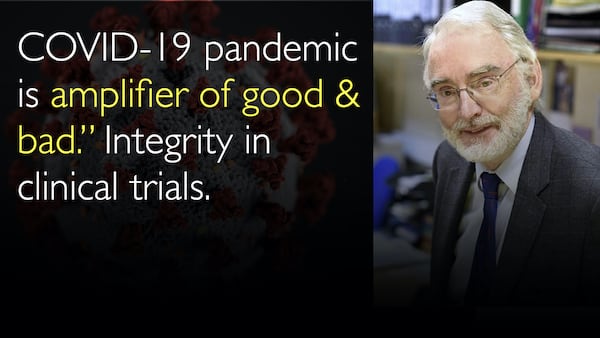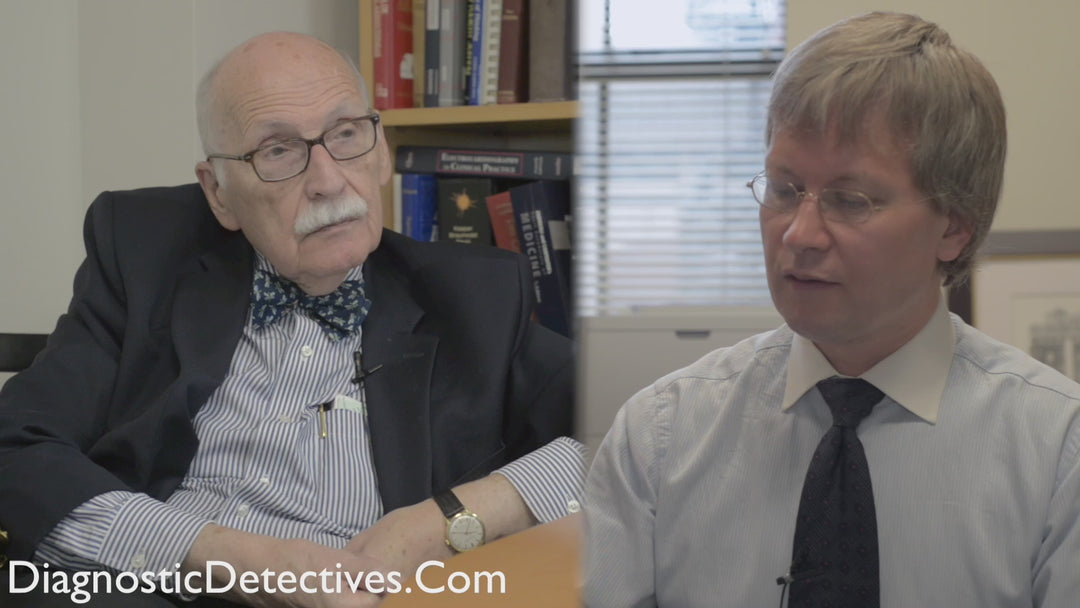Leading immunologist and amyloidosis specialist Dr. Mark Pepys, MD, explains the critical importance of scientific literacy for public health. He highlights the dangers of misunderstanding scientific principles, using examples like the disproven link between CRP and heart attacks and the ineffectiveness of homeopathy. Dr. Pepys also emphasizes the vital role of patient education, particularly for complex rare diseases like amyloidosis, and describes his work in creating comprehensive online resources for patients.
The Critical Role of Scientific Literacy and Patient Education in Modern Healthcare
Jump To Section
- The Scientific Education Crisis
- Science vs. Advertising: A Fundamental Difference
- The Danger of Misunderstanding Causality
- The Real Dangers of Pseudoscience Like Homeopathy
- The Vital Importance of Patient Awareness
- Building Resources for Amyloidosis Patients
- Full Transcript
The Scientific Education Crisis
Dr. Mark Pepys, MD, expresses deep concern over the widespread lack of adequate scientific education. He notes that this is a problem across all developed nations. Dr. Pepys points out the stark contrast between our high-tech world and the public's fundamental misunderstanding of how science works.
The modern world is built on scientific and technological advances. Yet most people are not taught about the core principles of scientific inquiry. This includes concepts like reproducibility, transparency, and honesty in research.
Science vs. Advertising: A Fundamental Difference
Dr. Mark Pepys, MD, uses a powerful analogy from physicist Richard Feynman to explain the scientific method. He contrasts the ethos of science with that of advertising. In advertising, the goal is to promote a product by only highlighting its benefits.
True science requires the opposite approach. Scientists have a duty to present all evidence, including data that contradicts their own hypothesis. This allows others to make a fully informed judgment. Dr. Pepys laments that even some scientists fail to grasp this fundamental principle.
The Danger of Misunderstanding Causality
A critical scientific concept often misunderstood is the difference between association and causation. Dr. Mark Pepys, MD, provides a clear example from his own field. For years, elevated C-reactive protein (CRP) levels were associated with an increased risk of heart attacks.
Many researchers incorrectly assumed CRP was a causative factor. Dr. Pepys and his colleagues used genetic epidemiology and laboratory experiments to definitively prove that CRP does not cause myocardial infarction. This case highlights how a failure to understand causality can lead to significant scientific errors.
The Real Dangers of Pseudoscience Like Homeopathy
Dr. Mark Pepys, MD, identifies homeopathy as a prime example of the public's "tone-deafness" to science. He explains that homeopathic remedies are diluted to the point of containing no active molecules. Therefore, they are pharmacologically inert and cannot have any therapeutic effect beyond placebo.
While this may seem harmless for minor ailments, reliance on such pseudoscience for serious conditions is dangerous. Dr. Mark Pepys, MD, states that using homeopathy for asthma, cancer, or bacterial infections can be fatal. It dangerously delays the time to a correct diagnosis and the initiation of effective, evidence-based treatment.
The Vital Importance of Patient Awareness
Beyond general scientific literacy, Dr. Mark Pepys, MD, is passionate about specific patient education. He believes it is crucial for patients to understand their own diseases. This is especially true for complex and rare conditions where information can be scarce or frightening.
Proper knowledge empowers patients. It helps them navigate their healthcare journey and make informed decisions alongside their doctors. Dr. Anton Titov, MD, discusses this need with Dr. Pepys, who sees patient awareness as a fundamental requirement of modern clinical care.
Building Resources for Amyloidosis Patients
Dr. Mark Pepys, MD, has actively worked to address the information gap for amyloidosis patients. He helped create a comprehensive, interactive website dedicated to this rare disease. The resource provides accurate information on all types of amyloidosis, available treatments, and potential complications.
The website includes a moderated forum where patients from around the world can connect and share experiences. Dr. Pepys finds that patients find this curated, reliable information extremely helpful. It demystifies their condition and provides practical guidance, fulfilling a critical need in rare disease management.
Full Transcript
Dr. Anton Titov, MD: Professor Sir Mark Pepys, leading immunologist, amyloidosis specialist, and drug discovery expert. Professor Mark Pepys, is there anything else you'd like to discuss regarding your work and research? Please share your wisdom.
Dr. Mark Pepys, MD: There are two things I'm very passionate about. One is that people need to understand what science is and how it is conducted. Science is not well taught. People do not have adequate scientific education in most, probably all, developed countries. This is unbelievable!
The world is such a scientific place. We all go around with these devices in our hands. All devices are full of high-tech. We travel in a very high-tech manner. We communicate in these extremely high-tech ways. Yet people are not adequately taught about science, the nature of science, what it involves, the reproducibility of science.
People do not understand the necessity for transparency and honesty. Richard Feynman, the great Nobel Laureate, an American physicist, famously said this: "You have a duty as a scientist. When you present your hypothesis, you must show all the evidence that is against your hypothesis, just as much as you show the evidence in favor of it. So that people can make up their mind, do they believe your hypothesis or not?"
He said the best method to explain this is to contrast it with advertising. Advertising is the complete opposite. You say "my product is the best". You don't say "Somebody else has got something which is almost as good, or might be cheaper..." You say "no, buy my product because it is the best". That is all you ever say in advertising. Science has to be the complete opposite.
Even the scientists don't always get that. Some scientists don't understand what science is about, as in the example of association and causality.
In the midst of that disagreement about the role of CRP, a very famous American cardiologist wrote in some comment on the web or somewhere. He fancies himself as an epidemiologist. He wrote about my failure to recognize that CRP was causative in myocardial infarction. He said it was complete ignorance and stupidity.
How could anybody ignore the compelling body of evidence that proved that CRP causes heart attacks? We see where that went. CRP does not cause heart attacks. We completely disproved it eventually with genetic epidemiology. We also disproved it by all the in vivo and in vitro experiments.
You have to understand what science is about. People need to be taught more about science. Because if they are not taught, the population becomes tone-deaf to science, as I say. When you are tone-deaf, you can't appreciate music. If you are tone-deaf to science, you can't understand anything about the modern world, because you haven't been educated about it and don't know what it is about.
Homeopathy is a classical example. Homeopathic medicines are nothing! They are zero. You've got a number of molecules you can't count in your "medicine", because they've been diluted deliberately so far that they are not there! How can that make you better?
When you've got a little pain in your big toe, it probably doesn't matter. But if you've got asthma or cancer or a bacterial infection and you rely on homeopathic "medicines", you are going to die! This is a disaster! It delays time to the correct diagnosis and correct treatment!
The other thing I'm very keen on is patient awareness. We have to make patients understand what their disease is. It is particularly acute in amyloidosis. These are the patients that I mostly deal with.
Amyloidosis is a rare disease, it is incredibly complicated. You may go on the web to find information about amyloidosis. You can find all sorts of really scary stuff. Well, it is a scary disease, it is a bad disease to have. But you need to have proper information.
I have been very active in the last few years to develop patient awareness for our patients with amyloidosis. Patients with this disease are all around the world. We created a fully interactive website for the patients. There is a forum where they can write in and have moderated replies and so on.
The patients find this extremely helpful. They can look up on this website anything about any type of amyloidosis. They can find out about the treatments, the complications of the treatments, what to do when some things happen.
Patients in general find that extremely helpful. That is very important. To communicate is very important.
I know there is a lot of patient awareness going on. It is a necessary requirement in most health services that the clinicians and centers provide this information. We have been very active in promoting amyloidosis information. That is an important thing to do if one can do it.







